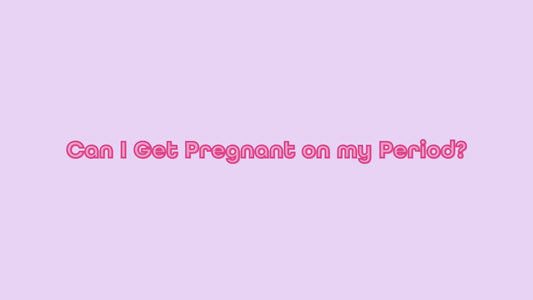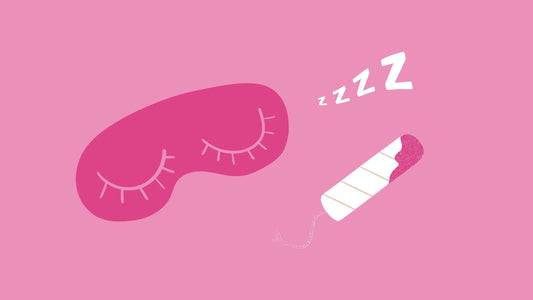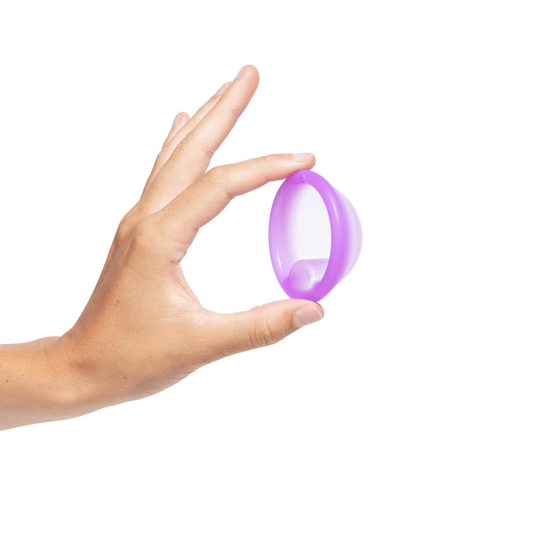
COVID Vaccine and the Menstrual Cycle
Share
If there is one thing that has been all over the news and caused the most controversy in the world, it's the covid-19 vaccine. People are questioning whether it's safe especially after so many reports of irregularity with women and menstrual changes. There has been some vaccine hesitancy wondering whether or not the vaccine will have an effect on a woman's menstrual cycle and her fertility.
In this article, we'll take a deep dive into what's been documented in research and what women have experienced when it comes to the covid vaccine and their menstrual cycle. Now keep in mind that most research we report in this article is early research with small sample sizes and it may be potentially skewed in favor of the medical community, but we also pull some other research you might want to take into consideration from other sources. We want our Garnuu Girls to be informed before they put anything in their bodies!
COVID and the menstrual cycle
Before we can really get into the effects of the COVID vaccine and the menstrual changes, we have to talk about some of the effects actual COVID can have on our cycles. We all know our menstrual cycles can be very finicky. Stress, weight gain or loss, excessive exercise, high soy consumption, hormones, blah blah blah can all affect your cycle. So it doesn't come as a surprise that illnesses like COVID can also affect it.
In general, when your body is enduring a severe illness, your body will temporarily reduce ovulation to redirect energy from reproduction to fighting off the illness. Which can effect the dates of your period.
There is also data that supports a longer menstrual cycle length as an effect of COVID. In a study done with 237 COVID patients, 40% of mildly ill patients experienced menstrual volume changes (heavy bleeding or low bleeding) and a longer menstrual cycle length than previously had. Their menstrual cycles returned back to normal though two months after hospital discharge.
In general, sickness and COVID for that matter do affect menstruation. Now does the covid-19 vaccine affect menstruation?
COVID vaccine and menstrual cycle
A woman is supposed to get her period every month. Every 28-35 days to be exact. Your period is very important. In fact, doctors say it's your 5th vital sign of health. That's pretty important! Getting your period indicates that you're healthy and your cycle is working properly.
However, there has been some recent claims that the covid-19 vaccination has caused more harm to women's cycles than good.
Real women, real menstrual cycles
Many women have claimed that their periods have been completely missing or extremely irregular since they received the vaccine (which for some was over a year ago). Even menopausal women have claimed to have started menstruation again after being in menopause for years!



Women in our own Garnuu community have expressed their experiences post-vaccine.



Controversy with "misinformation"?
In January, The Joe Rogan Experience had a guest, Dr. Robert Malone--an American physician and biochemist who has multiple patents for mRNA technology. They discussed the affects of the vaccine on the body and fertility. Consequently, Joe Rogan experienced an uproar of backlash for spreading "misinformation".
Candace Owens also interviewed Dr. Malone. You can find their discussion here on apple podcasts.
He discussed on both shows how the ovaries are what drive menstruation and the lipids from the vaccine go straight to the ovaries. Which is causing the disruption of normal menstrual cycles.
This in turn does affect fertility whether that is short term or long term, we don't know a lot of those affects--because there are not enough studies to fully prove it.
Even the Rabbi's know!
The Orthodox Jewish community is very aware of the issues surrounding the vaccine. Most Rabbi's know more about their congregation's menstrual cycles than most doctors do. For reference, many orthodox Jewish couples refrain from intimacy during a woman’s menstrual period and for seven days afterward. After the period is over, women will immerse themselves in the mikveh (a ritual bath located usually in the basement of a synagogue). The bath marks the point where the couple can reunite intimately.
When women have menstrual irregularities, it causes some problems when women are trying to conceive. The Rabbi's have expressed their concern for fertility given that many women's cycles have been severely affected.
Vaccines and menstrual cycles
Vaccinations in general have historically affected female menstruation. In a study of 30,000 Japanese women who each received an HPV vaccine were associated with increased age-adjusted odds of hospital visits for abnormal amount of menstrual bleeding, irregular menstruation and chronic-persisting abnormal amount of heavy menstrual bleeding . In addition, a clinical study found that women had lower levels of post-ovulation progesterone following inactivated influenza vaccination.
Yikes. Now what about the vaccine they developed in 'record time'?
Medicine research in general is not favorable for women. In fact, of the medical research performed 70% is conducted on males and only 11% involved females. As a result, it is not surprising that we know so little about how COVID-19 or the COVID-19 vaccines affect menstrual cycles or menopausal symptoms.
Other contributing factors affecting the menstrual cycle
We're seeing some weird stuff going on with the vaccine and normal menstrual cycles, however there are some other contributing factors that may be affecting your cycle in addition to the vaccine.
Environmental stress
Stress or cortisol. It's a killer. Women's bodies are very sensitive and can respond in a multitude of ways to stress. Including an irregular period. That's not to say that stress is the only cause of an irregular cycle, but that is something to keep in mind. You can learn more about cortisol and your period here.
Birth control
Birth control in general can alter your menstrual cycle, which can also be difficult to regulate once you get off of birth control. We have to keep this in mind when women receive the vaccine. You can see some of the side effects of the pill here.
Can the COVID-19 vaccine make you skip a period?
According to a U.S. study of 4,000 women, found that receiving the first vaccine dose had no impact on the actual timing of the next menstrual bleed. However, after receiving the second dose, women experienced a small delay in their menstrual cycle length--just under a half day on average.
In this study, those who received two doses of the covid-19 vaccine within the same menstrual cycle period had increased their menstrual cycle length by on average 2 days.
In a similar Norwegian study of over 5,500 people, 41% of participants reported disturbances in their menstrual cycles after receiving their second vaccine shot.
Can the COVID-19 vaccine increase your menstrual cycle length?
Yes, but supposedly only by a little.
Natural Cycles, the natural fertility tracking app, conducted a study on their users who all received the vaccine.
The natural cycles app researchers collected menstrual cycle data gathered between October 2020 and September 2021 from the app users that were United States residents aged between 18 and 45 years old and were at least three cycles post-pregnancy or post-use of hormonal contraception.
The researchers analyzed participant data from six consecutive cycles — three prior to the vaccine and three post-vaccine, or six consecutive cycles for those who remained unvaccinated.
The study included 2,403 vaccinated individuals and 1,556 unvaccinated individuals. Of the vaccinated cohort, 55% took the Pfizer-BioNTech vaccine, 35% the Moderna vaccine, and 7% the Johnson & Johnson vaccine.
The researchers found that vaccinated individuals had an average of 0.64 day menstrual cycle length increase after an initial vaccine dose compared with unvaccinated women.
This average increase in cycle length was slightly larger at 0.79 days for those who received the second dose of the vaccine when compared with unvaccinated individuals.
The researchers added that the increase in cycle lengths for both the first dose and second dose vaccine cycles may be largely driven by 358 people who received two vaccine doses within the same menstrual cycle (between day 1 and the last day of your cycle).
They note that this group experienced an average 2.38 days increase in cycle length compared with unvaccinated individuals. So if you got that double dose you had double the menstrual trouble!
By cycle six, the last of the recorded cycles, the researchers noted no significant differences in cycle length between the vaccinated and unvaccinated groups.
So it wasn't significant, but there was still an increase in cycle length for vaccinated women.
We'd be interested to see what the effects were post 12 months.
Can the COVID-19 vaccine make your period late?
For sure! One of the more recent studies (that you can't find on the internet), was conducted with 30,000 women in the United Kingdom who experienced changes in their menstrual cycles and unexpected vaginal bleeding.
Patients reported their post-vaccination symptoms to the UK's Medicines and Healthcare Products Regulatory Agency. Typically, patients will report a sore arm, fatigue, myalgia, and fever following a vaccination. However, these women experienced much of the same symptoms as the studies we mentioned above.
A lecturer at Imperial College London, Dr. Victoria Male, said that menstrual cycle changes had been reported among women who received both mRNA vaccines--Pfizer or Moderna vaccines and the adenovirus vectored covid-19 vaccines, such as AstraZeneca. She says the connection between vaccines and periods is likely a result of the immune response rather than a specific vaccine component. She continues to say, "Although reported changes to the menstrual cycle after vaccination are short-lived, robust research into this possible adverse reaction remains critical to the overall success of the vaccination program.”
That's great that the medical community is looking into these --however are they going into the study objectively or with their hypothesis to be proved?
You can say that for both arguments, but has there truly been an objective long-term study done?
Can the COVID-19 vaccine increase period symptoms?
Yes. If you have experienced some extra symptoms since receiving the vaccine, you are not alone. Another study was conducted in the MENA region (Middle East, North Africa) of 2269 child-bearing age women. The COVID-19 vaccine can increase period symptoms such as menstrual cramps, irregular periods, menorrhagia, missing periods, bleeding between periods (intermenstrual bleeding), increased period frequency, and increased length of periods. Of this study, the type of vaccine didn't matter. Each presented the same symptoms.
Overall 66.3% of women experienced menstrual abnormalities after vaccination. Of these symptoms, 30.5% of women saw changes within a week of vaccination and 86.8% saw symptoms develop within a month. Now those numbers are fairly high and 56.2% of them said it affected their quality of life significantly. Those must be some rough cramps!
Good news is, within 2 months about 96% of the symptoms were resolved. So the vaccine temporarily caused symptoms for women.
COVID vaccine and post-menopausal symptoms
Obviously there isn't much information on the vaccine effects on the menstrual cycle, but there is even less research on post-menopausal women. This has to be one of the most bizarre symptoms of them all! Women have reported coming out of menopause for a post-vaccine period!
Even though there are reductions in some immune cells in the endometrium (mucus membrane lining the uterus) post-menopause, immune cells are still reactive across the reproductive tract. And again, there is a scarcity of research on this subject.
Can you imagine? Surprise, you're not done menstruating!

Can the COVID vaccine cause infertility?
That's the biggest concern for many women and families. Will taking this vaccine affect my chances of getting pregnant in the future? The British government warned pregnant women not to get the vaccine due to the limited and lack of data showing its safety or efficacy in pregnant women.
MHRA Yellow Card Scheme report, dated December 9, 2020 through March 7, 2021 revealed 366% increase in miscarriage rates from pregnant women who received the covid vaccine.
Some of these studies and lack thereof are concerning especially for soon-to-be mothers and women who want to have children one day.
Time will tell whether these vaccinations affect fertility. Stay tuned, as Garnuu is gathering more data on this!
Ending thoughts on the COVID vaccine and menstruation
Overall, the conducted clinical research doesn't support dramatic effects to the menstrual cycle. However, that doesn't include the thousands of women who have experienced dramatic abnormalities.
We care about women's health and want you to be as informed as possible! For more content like this, check out our website.
Tell us your experience! We want to know how the covid-19 vaccine has affected you and your period symptoms?
If you found this article helpful, please share it with your friends!
XOXO,
Garnuu Team








